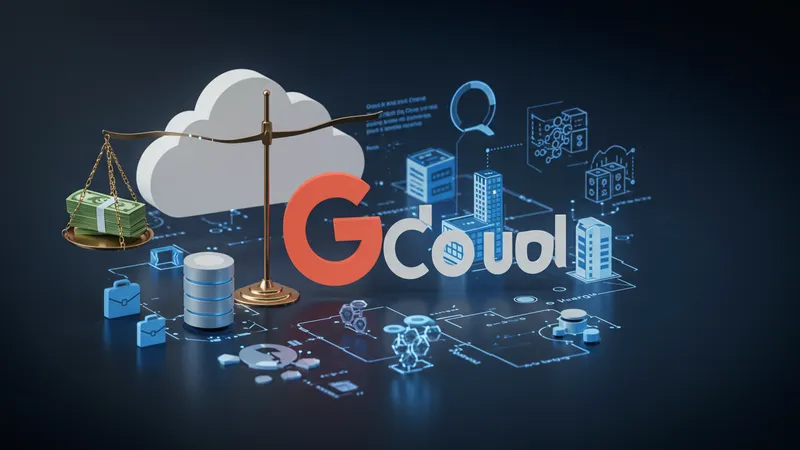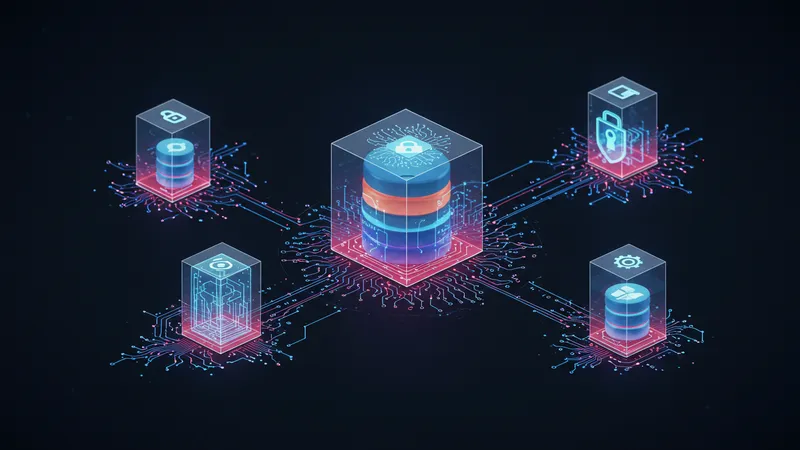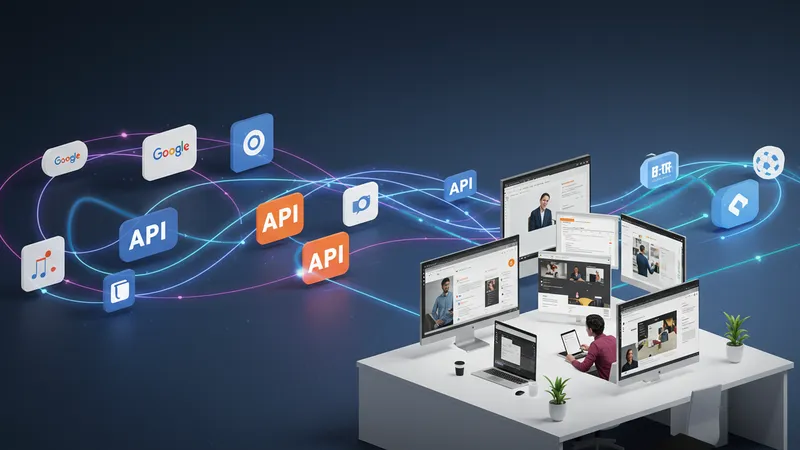


Imagine running a billion-dollar business without owning a single server. Bold claim? Welcome to the world of Google Cloud, where conventional computing boundaries blur, fueling an era of unprecedented scalability.
In a digital race where speed is king, cloud computing is more crucial than ever. As more businesses transition online, the need for efficiency and flexibility propels Google Cloud into the spotlight.

Cloud computing is not just about data storage anymore. Google Cloud has transformed it into a dynamic infrastructure where even the most daunting computing tasks are simplified. From enabling seamless AI integration to providing a robust security framework, it challenges the conventions. But that’s not even the wildest part…
Consider machine learning that reads more data in a single day than a human can in a lifetime! Google Cloud’s AI services don’t just store your information—they orchestrate and analyze, bringing insights to life. Yet, the real jaw-dropper lies in how multiple sectors are already using these insights to revolutionize their industries. But what happens next shocked even the experts…
When discussing pioneers in artificial intelligence, Google Cloud undeniably leads the conversation. Their cutting-edge AI and machine learning services allow companies to forecast, automate, and personalize like never before. The Google Cloud AI platform is not just a tool—it’s an empowered partner, enabling companies to design, train, and deploy models in ways that were science fiction just a decade ago. But there’s one more twist…

Timing is everything. Google Cloud’s ability to process real-time data and derive insights gives businesses an edge in swift decision-making. Think about this: instantaneous fraud detection or targeted marketing strategies that adapt in real-time. This agility enables industries to foresee challenges and adjust with unparalleled precision, keeping them ahead of the competition. The power rush doesn’t end here...
But AI isn’t just for tech giants. The democratization of AI ensures that businesses, regardless of their magnitude, can harness these advancements. Educational institutions use Google Cloud’s machine learning capabilities to personalize student learning plans, while hospitals enhance patient diagnostics with predictive algorithms. What you read next might change how you see this forever.
Why should anyone care? Well, as AI continues to evolve, it will redefine job roles and create new opportunities that didn’t exist before. Those who embrace this change will thrive, while others may be left behind in the dust of digital evolution. But here’s what’s even more intriguing about Google Cloud’s AI offerings…
The myths about cloud computing being exorbitantly expensive are just that—myths. Google Cloud’s pricing models are designed with flexibility and affordability in mind, catering to businesses of all sizes. From small startups embarking on their first digital journey to massive enterprises managing extensive data lakes, Google Cloud scales costs effectively, allowing users to pay only for what they use. But that’s just scratching the surface…

Through strategic pricing, businesses can leverage cost-effective solutions, like the Google Kubernetes Engine (GKE), which manages containers with just a few clicks. This not only reduces direct server costs but the often overlooked operational expenditures. It fundamentally reshapes financial planning for projects of any size. There’s more to unravel...
Understanding the savings from deploying Google’s cloud services isn’t just about the numbers. It’s about the opportunity costs missed by clinging onto outdated infrastructures. The flexibility and reliability reduce downtime, translating into consistent service delivery, which ultimately impacts customer satisfaction. That ripple effect is no minor edge...
Choosing Google Cloud also means opting for a robust support system. Imagine having dedicated resources and expertise tailored to help your business scale efficiently. Reliable resources and support ensure smooth transitions and maintain competitive momentum in the ever-evolving landscape of technology. Yet the real game-changer lies ahead...
Security breaches can topple even the most established enterprises. For Google Cloud, security isn’t an afterthought but a core component. With the best cybersecurity practices, it offers an infrastructure built on zero-trust architecture, ensuring the most stringent protection of data. But the level of commitment goes way beyond industry standards…

Google Cloud’s approach involves a layered defense strategy—encryption at rest and in transit, identity management, and threat detection—creating a fortress of protection. Think of data encapsulated in unbreakable algorithms, with constant updating and monitoring. Yet, there’s an element that sets it apart…
Alongside technical safeguards, Google Cloud prioritizes compliance with global standards. This dedication keeps businesses aligned with mandates like GDPR and HIPAA with minimal hassle. In the age where privacy fears reign supreme, such compliance is more substantial than it sounds. But the story doesn’t end here…
Security also involves foresight. Google Cloud deploys AI to predict potential vulnerabilities, allowing businesses to proactively strengthen their defenses. This preemptive action shifts the narrative from “responding to breaches” to “preventing them altogether.” It’s a level of security assurance that only a pioneer can provide. But hold on, because what comes next is particularly eye-opening…
Within the Google Cloud ecosystem, innovation thrives. By delivering collaborations across diverse platforms and tools, businesses dive into a collaborative network that enhances creativity and productivity. It’s a playground where innovation assumes limitless dimensions, offering numerous APIs and seamless integrations. But what stands out is…

Developer flexibility. Google Cloud’s environment supports multiple languages and tools, granting developers the resources they need to build visionary products. As teams deploy applications swiftly across global data centers, it skips past traditional bottlenecks, ensuring smooth, uninterrupted service. Imagine the possibilities with each new code written…
This ecosystem is far from isolated. It’s an inclusive community that supports open-source contributions, allowing a two-way exchange of ideas and advancements. Encouraging this symbiotic relationship with the global developer community helps fuel continuous improvement, unlocking potential doors that lead to technological breakthroughs. Yet another dimension adds to this narrative…
Encouraging innovation doesn’t stop at technological tools but extends into thought leadership. Google Cloud hosts events, summits, and workshops, fostering an environment of learning and exploration. By nurturing this culture of innovation, it positions itself as not just a service provider but a cornerstone for technological evolution. But trust me, there’s more you need to know…
Google Cloud’s global data centers are its forte, stretching over 200 countries and territories. By maintaining vast infrastructure worldwide, it allows for reduced latency, giving customers coherent connectivity and consistent performance irrespective of location. The seamless experience it provides is just the tip of the iceberg…

This global reach also empowers businesses looking to scale internationally. With the right resources and local compliance at your fingers, expanding to global markets becomes less daunting. It offers an invaluable advantage, enabling momentum at each stage of growth—local and international alike. But brace yourself for more insights…
In an age where remote working reigns, Google Cloud supports a network that connects employees and customers all over the globe. Tools like Google Workspace ensure collaborative capability that breaks geographical barriers, fostering innovation from anywhere. But there’s another layer worth unpacking…
The environmental commitment of Google Cloud extends globally. Emphasizing sustainability, it powers its operations with renewable energy and contributes significantly to reducing carbon footprints worldwide. Aligning business growth with responsibility, Google Cloud reaffirms that innovation can resonate with holistic global wellbeing. But the narrative is far from over…
Often overlooked in tech discussions, sustainability is a crucial part of Google Cloud’s ethos. It stands as a benchmark for eco-friendly innovation, powered entirely by renewable energy since 2017. That translates to not just being a leader but setting a precedent for responsible tech. And that’s just opening the conversation…

This sustainable approach isn’t limited to energy sources. Google Cloud’s efficient data centers operate with better cooling systems and improved resource management, minimizing environmental impact. Each innovation echoes with environmental mindfulness, allowing businesses to grow sustainably in tandem. But dig further, and you’ll find…
The commitment to sustainability extends into research and innovation. Google Cloud invests in AI-driven ecological projects, aiding in everything from climate modeling to pollution tracking. Supporting such initiatives showcases their dedication beyond operational responsibility and emphasizes global ecological welfare. But there’s an element you need to delve deeper into…
Their approach inspires change beyond corporate confines. By driving awareness and education around sustainability practices, it invites its community and customers into the mission. Encouraging collective responsibility sets a ripple effect, ensuring that sustainability isn’t just an operational goal but a shared global aspiration. But we’ve yet to reveal Google Cloud’s scaling potential…
Seamless integration within clouds is where Google truly shines. For businesses juggling varying applications, Google Cloud provides APIs and connectivity options that harmonize disparate systems into one cohesive environment. No more silos, just fluid collaboration. But wait, there’s more...

Google Workspace—a lineup for the ultimate collaborative experience—transcends the typical office suite by enhancing teamwork dynamics. Real-time editing, intuitive communication tools, and AI-assisted productivity features fall under one roof, redefining what effective collaboration means. And that’s only scratching the surface…
The platform also promotes cross-functional collaboration. Whether collaborating across departments or continents, Google Cloud ensures a unified work environment. Shattering barriers, it enables real-time engagement that fosters innovation and productivity like never before. Yet, integration is just part of the narrative…
The seamless engagement catalyzes creativity beyond organizational boundaries. Nonprofits, educational institutions, and other sectors also harness these tools to drive meaningful impact. By giving everyone a seat at the table, Google Cloud stands as an enabler of vast potential, extending beyond profit-driven focus. But ready for another mind-bender? Continue exploring Google Cloud’s role in digital transformation…
Digital transformation is a buzzword, yet few understand its full potential. Google Cloud empowers businesses with the tools to transform disruption into an opportunity, leading pioneering transformations across sectors. But what distinguishes Google Cloud’s strategy…

Transformation isn’t simply about technology adoption—it integrates a culture shift. Google Cloud’s resources purposefully extend beyond servers and applications, including comprehensive training programs that arm business leaders and their workforce with skills for the future. It’s adopting a mindset shift along with technological tools. Before moving on, consider this…
The role of Google Cloud in digital transformation accentuates the role of analytics. BigQuery allows for actionable insights derived from oceans of data, steering informed decision-making across industries. The transition from data blindness to data clarity marks a pivotal point for modern businesses. Still, the real leverage lies ahead…
Emphasizing agility is crucial. The combination of cloud infrastructure, AI, and real-time data puts businesses on the cutting edge of innovation, fostering adaptability to market shifts. As industries continue to morph, those equipped with agility secure strategic advantages, keeping them relevant in a world of rapid changes. And wait until you uncover the intricacies of Google Cloud’s influence in unlocking potential…
Small businesses can scale unprecedented heights through Google Cloud’s accessible resources. By tailoring services for varying sizes, startups find themselves equipped with enterprise-grade technology without hefty financial commitments. But what really empowers them?

The platform offers an array of credits and training, igniting innovation among small businesses. From foundational support to sophisticated AI, Google Cloud levels the playing field. Dreams that once felt out of reach become attainable realities. But how does this impact the broader scope of innovation?
Startups often serve as catalysts in pushing boundaries. By enabling them to utilize Google Cloud’s end-to-end suite, it stirs a pot of creativity, forcing established players to rethink their strategies. This dynamic drive of experimentation and adaptation pushes industries forward. And the ripple effect continues…
Even micro-businesses see transformative power through improved operational efficiency, collaboration, and market scalability. Aligning ambition with resources means more players can enter markets confidently, strengthening the economy and driving diverse innovations. Yet the core competency cultivates expansion on a larger scale…
Education in cloud computing offers endless possibilities, and Google Cloud leads with unequivocal commitment. By introducing specialized learning modules and training, it develops tomorrow’s cloud experts today. But what sets this initiative apart?
The platform transcends typical online courses by offering interactive sessions, hands-on labs, and real-world projects. Designed for personalized growth, it caters to varied learning paces. Associating credentials with pride, it supports a community edified to his advantage. But why just stop at learning?
Those upskilled in Google Cloud become catalysts for organizational metamorphosis. Fueling digital transitions, they guide businesses into the digital age efficiently. A well-prepared workforce not only ensures seamless execution but encourages a culture of continual improvement and innovation. So what’s the next big leap?
Collaboration with educational institutions takes this initiative further. By integrating with academic curricula, Google Cloud prepares students early, aligning education with ongoing tech trends. Through partnerships, the technological divide closes, ensuring that future generations are primed for success in the rapidly evolving tech landscape. And there are even broader vistas to explore…
Enter the pledge era, where Google Cloud’s commitment goes beyond profit margins to embrace societal impact. Addressing societal challenges through the power of technology pushes the brand beyond a service provider to a catalyst for global change. But where does this road lead?

Fundamentally, Google Cloud aligns its business strategies with broader goals, such as environmental sustainability and technological equity. These goals aren’t just promises painted green but initiatives substantiated through tangible action, creating ripples worldwide. Yet, what propels it forward beyond goodwill?
The promise extends to nurturing an innovative spirit and economic powerhouse, championing equitable technology access. From educational efforts to empowering entrepreneurs globally, it bridges socioeconomic gaps, creating stronger, more resilient economies. Meanwhile, Google’s influence encompasses…
Fostering a digital understanding that attracts next-gen talent addressing tomorrow’s challenges today. Innovating under Google Cloud’s banner means contributing to a culture that values progress, sustainability, and collaboration. The horizon hints at possibilities yet to be realized, fueling optimism and igniting ambition across continents. A remarkable journey lies before you…
Google Cloud’s foray into healthcare transcends the norm, aiming to redefine how medical data is utilized. By employing cutting-edge analytics and AI, healthcare providers tap into possibilities that redefine patient care standards. But what sets Google Cloud apart from the rest?

Data accessibility has never been more crucial. With electronic health records ready at fingertips, Google Cloud breaks down silos, allowing comprehensive assessments. This empowerment of data transforms individual care into collective well-being, capable of proactive health solutions. What does this signify for the broader healthcare community?
Breaking barriers creates collaborative ecosystems, enabling research, clinical, and technological fronts to converge. By fostering a culture of openness and shared learning, the healthcare industry marches toward rapid innovation and patient-centered models. Uncover the layers to this transformative approach…
Through predictive models, Google Cloud navigates future healthcare challenges, from early disease diagnosis to personalized medicine. Precise and timely intervention transcends geographical boundaries, enabling a unified healthcare experience globally. As the digital and biological realms intertwine, possibilities for improvement extend beyond imagination. Yet there’s a deeper story in this evolution…
Real-world applications of Google Cloud in groundbreaking case studies highlight its untapped potential. By citing industries that have harnessed Google’s technology, individual transformations emerge as powerful testaments to the platform's value. But what compels these stories to inspire?

Consider retail: tailoring customer experiences based on predictive AI insights. What was once guesswork now leads businesses in anticipation of consumer needs. This elevation of engagement carries significant ramifications for profitability and satisfaction. How does it scale across industries?
In the finance sector, fraud protection powered by real-time analysis changes the playing field. Agile systems adopt preventative measures instead of mere reactionary strategies. This shift transforms operational paradigms and paints a promising future for security. Yet there’s another element embedded in stories of change…
Education, transportation, entertainment—every sector witnesses dynamic growth stories as Google Cloud introduces inherently transformative potential, fortifying rapid adaptation. Leveraging data and intelligence, industries see possibilities toward process efficiencies and scaling new heights. Be ready for insights that challenge existing notions…
While Google Cloud offers numerous benefits, hidden costs can sometimes creep up unexpectedly. Businesses often underestimate ancillary expenses associated with cloud deployment, focusing primarily on operational costs. Yet unseen elements stand in the way of accurate financial forecasting.

Integrating Google Cloud often demands cultural shifts and training, and expected savings can be overshadowed by initial adjustment phases. Businesses must find balance through effective management to ensure technological progress. It’s critical to recognize these hurdles early.
However, hidden costs are countered by the extensive support network and ongoing learning resources they provide. Success lies in strategic utilization rather than viewing costs in silos. Forethought ultimately extends a competitive edge as businesses navigate these complexities.
Understanding these costs eliminates the element of surprise and aligns expectations with reality. Recognizing the financial nuances informs strategic choices, ensuring Google Cloud remains not just an expense but a critical investment in a data-driven future. Realize the power of mastery over these intricacies…
One-size-fits-all is obsolete. With Google Cloud, customization extends far beyond standard offerings. Businesses can adapt solutions tailored precisely to their unique needs. Personalized experiences drive higher productivity and engagement. But what truly makes this differentiation compelling?

Endless integration possibilities ensure that personalized solutions adhere meticulously to each business’s demands. From customized machine learning models to data processing tailored toward niche markets, Google Cloud resonates with specific industry goals. Let’s delve deeper into this approach!
Personalization extends to customer interactions, maximizing touchpoints and enhancing relationships. Businesses thrive by carving unique competitive advantages that weren’t previously possible. The scalability aligns profitability with enriched experiences. Exploring nuanced personalization requires sharper focus.
However, customization is a journey in itself. It involves weaving intricate threads of understanding and innovation into existing frameworks. Overcoming challenges during implementation propels growth and adds significant value. Businesses grasp the transformative power of personalization with Google Cloud’s potential…
Shifting to cloud computing stirs critical debate surrounding data migration. The scale and complexity of migration vary widely, creating concern over data accessibility and integrity. It’s not just a technical process—it’s a strategic commitment requiring gradual adaptation.

Data migration involves understanding risk, orchestrating detailed planning, and often restructuring existing protocols. The fluidity provided by Google Cloud’s migration services smoothens these transitions, offering insights into potential challenges ahead of deployment.
Decision-makers often worry about data sovereignty, geopolitical regulations, and privacy adherence. Google Cloud addresses these with robust security and compliance measures, illuminating a path that combines innovation with responsibility.
Effective data migration accelerates transformation, unlocking strategic advantages by broadening digital capabilities while containing potential threats. Capturing comprehensive foresight and partnership ensures a streamlined transition, marking a crucial juncture in a business’s digital journey with Google Cloud.
Wrapping our journey through Google Cloud reveals how it stands as a pillar in today’s technological revolution. Its potential to transform industries—from burgeoning start-ups to global giants—offers uncharted possibilities. Mastering these dynamics enables businesses to harness unparalleled digital capabilities.
We extend the invitation to explore, share, and engage with Google Cloud. Stay ahead, evolve, and let technology shape your future. Bookmark this extensive guide, and take action by leading innovative progress in your field.